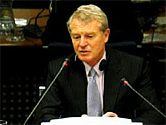 |
Jeremy John Durham Ashdown, known as Paddy Ashdown, is a leading British politician, who served as an envoy for the British government during the Kosovo crisis in 1998 and 1999. |
Paddy Ashdown relates what he told Slobodan Milošević during a meeting with him on 29 September 1998 in Belgrade about crimes that he saw being committed in Kosovo:
"Mr. President, you have been generous with your time, and if I may say so, also in allowing me to come to your country. I shall have some harsh words to say about what I have seen [in Kosovo] but I like the Serb people and I do not believe that you can condemn a nation. I must tell you, however, that the international community will act if you do not stop. You are, in my view, employing a policy that is entirely counter-productive and allowing the good name of the Serb people to be dragged down. I beg you to put a stop to this action which besmirches the representation of your country."
During the same meeting in September 1998, after warning Milošević that the actions of Serb forces in Kosovo were illegal under international law, Paddy Ashdown said the following:
"I told him that in my view, if he were to continue with these operations, he would make himself indictable for war crimes because he was personally responsible for any further continuation after this meeting."
Paddy Ashdown was among the first representatives of the international community to put Slobodan Milošević on notice of crimes being committed in Kosovo. His testimony is one of many that helped the Prosecution in its efforts to demonstrate that Slobodan Milošević knew about crimes that forces under his command were committing against Kosovo Albanians, which is one of the legal elements necessary to hold him accountable for the actions of his subordinates.
Ashdown began his testimony by describing what he witnessed first hand on two trips to the region in June and September 1998. Denied a visa to enter Yugoslavia to visit Kosovo, at the end of June 1998 Ashdown observed the Yugoslav military’s movements from the mountainous Albanian border. In September 1998, Ashdown spent three days in the conflict-torn province.
Ashdown testified that Serb forces were using heavy-handed and indiscriminate tactics in fighting the Kosovo Liberation Army (KLA). He said that the Albanian civilian population was the primary target and bore the brunt of the attacks. The usual pattern that the attacks of Serb forces followed, Ashdown explained, was to order the civilians to leave, and then shell, burn and destroy the village. He stated that such operations were continuing during his tour in Kosovo, and were implemented by both police and military forces, complete with tanks, armoured personnel carriers and heavy artillery.
In his journey through western Kosovo, Ashdown saw villages and towns razed to the ground, uninhabited, all the properties roofless, having been set on fire, evidence of gunfire, with shell holes and putrefying dead cows strewn in the fields. Ashdown also met Kosovo Albanians who had been ordered out of their villages and were fleeing in tractors, or were sheltering from the rain under plastic sheets, or hiding in forests. In regions of Albania bordering Kosovo, he saw Kosovo refugees of both sexes and all ages pushed from the Peć/Peje and Djakovica/Djakova areas, victims of this Serb pattern of attacks. Many of them had been wounded by shells, shrapnel, and gunfire, some were ill and others close to death.
After his visit to Kosovo, Ashdown went to Belgrade to meet with President Slobodan Milošević. He handed him a letter from British Prime Minister Tony Blair, who called on the Yugoslav President to stop the use of excessive and indiscriminate force.
Ashdown then confronted Milošević with an account from his Kosovo journey. He told Milošević that Serb actions in Kosovo “can only be described as indiscriminate, punitive, designed to drive innocent civilians out of their properties, [and] could not be explained by any targeting military operation …” He pointed out to Milošević that the actions of Serb forces were in breach of the Geneva Conventions and that Milošević was ultimately responsible for them.
Milošević at first flatly denied that any of this was happening in Kosovo. When pressed, he conceded that such actions may be going on, but that he was not responsible for them and that he would take necessary steps to put an end to them and punish those in charge. Yet, Milošević also claimed that such measures were necessary to fight terrorism, and every state had the right to do so. Ashdown agreed with this principle, but disagreed that what he saw in Kosovo could be described as a legitimate fight against terrorism. “I knew that the kind of actions he was taking would not destroy terrorism. They would only create more terrorism,” said Ashdown.
At the end of the meeting, Ashdown also warned Milošević that if the actions in Kosovo continued, the international community would be left with no option but to intervene and he himself could be tried for war crimes.
Paddy Ashdown was the leader of the Liberal Democrats, a British political party, from 1989 till 1999. He retired from the British House of Commons in 2001, was knighted in 2000 and made a peer in 2001. In September 2002 he became High Representative for Bosnia and Herzegovina, a position that he held until May 2006.
Read Paddy Ashdown's full testimony on 14 March 2002 and 15 March 2002.

